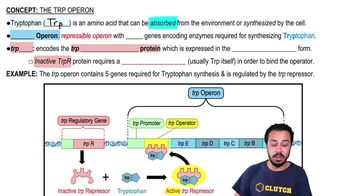The Trp Operon quiz Flashcards
 Back
BackThe Trp Operon quiz
1/16
Terms in this set (16)
- What happens to the trp operon when tryptophan is abundant in the environment?The trp operon is repressed because tryptophan acts as a corepressor, activating the trp repressor protein which then binds to the operator and inhibits transcription.
- How does tryptophan function in the regulation of the trp operon?Tryptophan acts as a corepressor by binding to the trp repressor protein, activating it to bind to the operator and block transcription.
- What is the role of the trp repressor protein in the presence of tryptophan?The trp repressor protein, when activated by tryptophan, binds to the operator and inhibits transcription of the trp operon.
- What occurs to the trp operon in the absence of tryptophan?The trp operon is active and transcription proceeds because the trp repressor protein remains inactive without tryptophan to act as a corepressor.
- Why does the trp repressor protein remain inactive in low tryptophan conditions?Without tryptophan to act as a corepressor, the trp repressor protein cannot bind to the operator, allowing transcription to proceed.
- What is the function of the enzymes produced by the trp operon?The enzymes synthesized by the trp operon are responsible for the biosynthesis of the amino acid tryptophan.
- How does the trp operon differ from the lac operon in terms of regulation?The trp operon is a repressible operon that is normally on but can be turned off, while the lac operon is an inducible operon that is normally off but can be turned on.
- What are the five genes encoded by the trp operon?The trp operon encodes five genes: trpA, trpB, trpC, trpD, and trpE.
- What is the effect of tryptophan on the trp repressor protein?Tryptophan activates the trp repressor protein, enabling it to bind to the operator and repress transcription.
- What happens to the trp operon when tryptophan is present?When tryptophan is present, it activates the trp repressor protein, which binds to the operator and turns off the trp operon.
- What is the role of RNA polymerase in the trp operon?RNA polymerase binds to the promoter of the trp operon to initiate transcription when the trp repressor is inactive.
- How does the trp operon ensure the cell does not synthesize unnecessary tryptophan?The trp operon is repressed by tryptophan when it is abundant, preventing unnecessary synthesis of tryptophan by the cell.
- What is the regulatory molecule for the trp operon?The regulatory molecule for the trp operon is tryptophan.
- What is the initial state of the trp repressor protein before binding to tryptophan?The trp repressor protein is initially inactive before binding to tryptophan.
- What is the consequence of the trp repressor protein binding to the operator?The binding of the trp repressor protein to the operator inhibits transcription of the trp operon.
- which of the following evidence best supports a claim that tryptophan functions as a corepressor?The best evidence supporting the claim that tryptophan functions as a corepressor is that in the presence of high tryptophan levels, tryptophan binds to the inactive TRP repressor protein, activating it. This active repressor then binds to the operator region of the trp operon, blocking transcription. This mechanism prevents the synthesis of tryptophan when it is already abundant, demonstrating its role as a corepressor.



